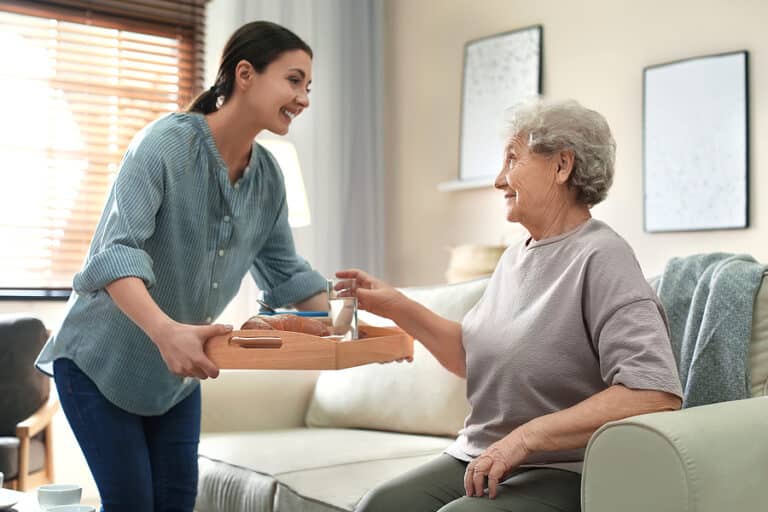Dehydration happens when the body loses more fluids than it takes in. This can throw off the body’s fluid balance and cause significant health issues. This situation is especially dangerous for seniors, who are already more likely to become dehydrated due to age-related changes in their bodies, certain medications, or a decreased ability to recognize they’re thirsty, thanks to issues with cognitive functioning. Recognizing the signs of dehydration in seniors is essential for their safety. Keep reading to learn how to recognize and potentially prevent dehydration, and how home care can help.
Symptoms of Dehydration
With home care, seniors have built-in monitoring to detect when something might be wrong. This helps seniors and their loved ones feel at ease. Common symptoms of dehydration are listed below.
- Dry mouth and lips: A dry mouth, which can be followed by cracked or sticky lips, is one of the first signs of being dehydrated.
- Changes in bathroom routine: Less urine or dark-colored urine are signs of not drinking enough fluids, possibly leading to dehydration.
- Fatigue and weakness: Being dehydrated can make seniors feel tired and weak all over, which can make them have less energy and do less.
- Dizziness and confusion: When seniors are dehydrated, they may feel dizzy, lightheaded, or confused. Since they are already at risk for falls, feeling this way can be dangerous for them.
- Sunken eyes and cheeks: When the body loses fluid, seniors might look like their eyes and cheeks are sunken.
- Dry skin: Seniors who don’t drink enough water may have dry, cool skin that doesn’t stretch and feels rough.
- Low blood pressure and a faster heart rate: Being dehydrated can cause a faster heart rate and low blood pressure. This can cause a situation called orthostatic hypotension, in which the blood pressure drops a lot when seniors stand up, making them feel dizzy or faint.
Preventing Dehydration in Seniors
As you can see, the symptoms of dehydration are similar to the symptoms of many other conditions seniors face, which can make it hard to know if they are dehydrated. This is why home care is so essential. Home care providers can catch when things that aren’t routine happen and hopefully help seniors get the care they need. Other prevention tips are below.
- Adequate fluid intake: Remind seniors to drink fluids throughout the day, even if they don’t feel thirsty. Provide water, fruit juices, herbal teas, and other drinks that can help them stay hydrated.
- Keep an eye on the side effects of your medicines: Since some medications increase the risk of dehydration, it’s important to pay attention to side effects and how they react. This is especially important when they start a new medication.
- Eating a balanced diet: Eating foods like fruits and veggies that are high in water can help seniors stay hydrated. Home care providers can introduce foods that are beneficial for seniors and help them with meal planning.
Since seniors are at a higher risk for dehydration, it’s important for them and their home care team to understand the symptoms and ways to prevent dehydration. Proper monitoring and care will improve their hydration and decrease the risk.
Source:
https://www.webmd.com/healthy-aging/what-to-know-about-dehydration-in-older-adults
https://www.healthline.com/health/symptoms-of-dehydration-in-elderly
If you or an aging loved one are considering home care in Granbury, TX, please contact the caring staff at Clear Path Home Care today. Call (817) 631-7710.
Clear Path Home Care provides compassionate, high quality home care in Parker County, Tarrant County, Johnson County, Hood County, Somervell County, Erath County, Bosque County and Hamilton County in Texas.
- Parkinson’s Disease: Understanding Causes, Symptoms, and Treatment - May 23, 2024
- Unexpected Ways Companion Care Can Help Your Mom - May 14, 2024
- Rituals to Help a Senior Practice Mindfulness Everyday - May 9, 2024






